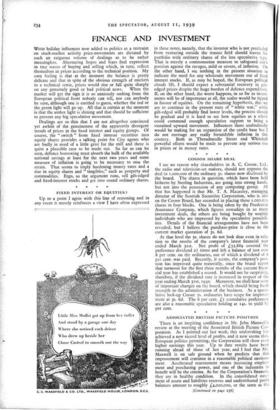FINANCE AND INVESTMENT
WITH holiday influences now added to politics as a restraint on stock-market activity price-movements are dictated by such an exiguous volume of dealings as to be rather meaningless. Alternating hopes and fears find expression in tiny waves of buying and selling which, in turn, reflect themselves in prices according to the technical position. My own feeling is that at the moment the balance is pretty delicate and that in spite of the obvious strength of markets in a technical sense, prices would rise or fall quite sharply on any genuinely good or bad political news. When the market will get the sign it is so anxiously seeking from the European political front nobody can tell, nor can anybody be sure, although one is entitled to guess, whether the red or the green light will go up. All that is certain at the moment is that the amber light is shining and that should be sufficient to prevent any big speculative movement.
Dealings are so thin that I am not altogether convinced yet awhile of the genuineness of the apparently divergent trends of prices in the fixed interest and equity groups. Of course, the " switch " from fixed interest securities into equity shares provides a talking point for City agents who are badly in need of a little grist for the mill and there is quite a plausible case to be made out. So far as can be seen, defence borrowing must absorb the bulk of the available national savings at least for the next two years and some measure of inflation is going to be necessary to ease the strain. That seems to imply hardening money rates and a rise in equity shares and "tangibles," such as property and commodities. Ergo, so the argument runs, sell gilt-edged and fixed-interest stocks and get into sound ordinary shares.
* * * *








































 Previous page
Previous page